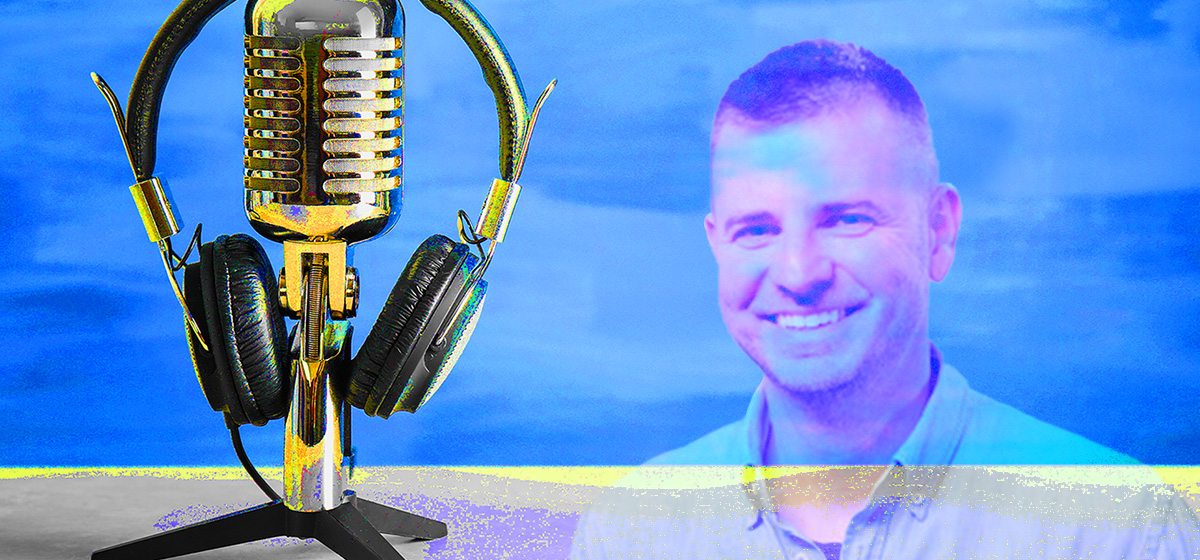The Contours of the Creative Economy

Donald Bonk interviews Nathan Martin, founder and CEO of Deeplocal, as part of the Pittsburgh Tomorrow podcast series. This interview was conducted before COVID-19. The transcript is abridged and edited for clarity.
View the episode archive here. View Nathan Martin’s profile here.“What we are doing is producing and incubating these kinds of students that are multifaceted, that have interests in art, music and theater, but also in computer science, architecture and design.” —Nathan Martin, founder and CEO of Deeplocal
Donald Bonk: This is Donald Bonk here for the Pittsburgh Tomorrow project for Pittsburgh Quarterly magazine. I’m pleased to have as my guest Nathan Martin, founder and CEO of Deeplocal. We’re here in the Fort Pitt Brewery in Sharpsburg, where Deeplocal is headquartered. Welcome, Nathan.
Nathan Martin: Thanks for having me.
Bonk: Can you tell us a little bit about how you got here and your backstory?
Martin: I’ve been running Deeplocal for almost 14 years. I founded the company in 2006 as a spin out from the Carnegie Mellon Studio for Creative Inquiry, which is a kind of art and technology research lab. My own personal background is in fine art. I accidentally started a company that originally was based around creating proprietary software, and that evolved over the years into being a service company.
We work primarily in marketing now. We build interactive technology that often shows up in events, permanent installations or architectural installations. Google’s our largest client. We also work for people like Netflix, Lyft and Airbnb.
Bonk: It’s a global brand here in Sharpsburg, but it touches these major corporations and does really transformative work. The website is deeplocal.com, so folks can take a look there if they’d like to learn a little bit more about Nathan and the super projects that he’s doing with Deeplocal.
Today we’re here to talk about the future of Pittsburgh. What do you think would make Pittsburgh the best or most ideal city in the world?
Martin: The simple answer would be better weather, but the more complex answer—I need to talk a little bit about my own background. Starting a business in Pittsburgh in the creative field was difficult at first for a number of reasons. It was difficult for us to find local clients. The kind of economy that we had to participate in, were economies that were in places like San Francisco, New York or L.A. That was difficult to start out from Pittsburgh and to have to build a reputation outside the market.
Historically and even to this day, we have very few, if any, local customers for what we do. What would make Pittsburgh ideal is if we truly had a strong kind of creative economy where we bought and sold services from one another.
Bonk: That gives us some perspective on the business environment that really is critical for growing companies like yours. The next question is around the moonshot idea. The way we’d like to put it is, what’s the one big transformational idea that you would propose for Pittsburgh? And second, what is the impact on the identity and narrative for the city of Pittsburgh if you put that moonshot into place?
Martin: I don’t know how much of a moonshot this is. I’ll try my best because it’s actually not that unreachable. What I’ve learned is that Pittsburgh is becoming really, uniquely, a creative technology hub. What I mean by that, is what we are doing is producing and incubating these kinds of students and kids that are multifaceted, that have interests in art, music and theater, but also in computer science, architecture and design. Those students, I don’t think from my perspective, have found a good place for themselves in the workforce of the world.
They would prefer to start their own business rather than end up at Google, Facebook or one of the other large companies because they don’t really fit that well. They have too many interests. They don’t fit traditional business models very well, but they are likely to start their own businesses.
I’ve seen a lot of change in the last decade in how we incubate startups here in Pittsburgh, but there’s still not enough focus on what those businesses can be and what their identity is, what their brand is.
When our business started, we used to hear a lot about medical technology companies. That was where all the focus was 15 years ago. Now, we have more focus locally on autonomous vehicle technology companies. Creative technology is a space where there is no epicenter yet. New York is probably the closest. Amsterdam is also pretty big.
Pittsburgh could be the epicenter of creative technology through building a creative technology hub. This could be a performance space. It could be a venue. It could incubate small businesses and startups that could connect local students and internship programs with local startups and companies. Creating a creative technology hub, a space for both performance education and incubating startups, would be right.
Bonk: This crossover, which is a uniquely Carnegie Mellon thing, is this hyper creativity in the arts, but then mixing and matching it with STEM.
Martin: It’s happening at every university right now. It’s not unique to Carnegie Mellon anymore, but we do have a long history in being that and having programs like the Studio for Creative Inquiry, where we’ve mixed art and technology over the years, and having a strong arts program within a university that has a strong technical program that is more rare in the country.
We can piggyback on that. It’s the reason my company is here, the reason so many of my staff come out of those programs, and I think also you’ll see a lot of the staff populating other companies like Shell Games and some of the others in the creative industry here.
I’d love to see more focus. What we’ve been seeing in the last decade is that we’ve realized we can sustain small startups. We have incubators now in place much more than we had a decade ago. We have some more support for things like Alpha Lab, for some of the small startups coming out of universities.
But we don’t yet have an identity. I don’t feel like there’s a brand around what we produce here. That brand could be creative technology. We have a competitive advantage over other cities in that space. CMU helps with that.
That’s not to downplay the role of somewhere like Pitt or some of the other local universities, but Carnegie Mellon specifically is ground zero. It gives us such a heads up. I see it with our internship recruiting.
We appeal to hybrid students more than most companies do. Our internship pool this year was over a 1,000 people that applied. That’s a lot for a small business that’s certainly regional. That is a testament to not necessarily what Deeplocal is, but what Deeplocal represents: a place where these people who have these multifaceted interests, who are not one person, don’t fit quite as well at other companies, want to be, and see themselves.
There can be support for much more companies… a broader ecosystem. That is our product coming out of Carnegie Mellon: these students that have creative interests but with a technology background.
How can we incubate them more fully? That needs some thought. As we mature in our environment here, we can be a little bit more specific about what our identity is. That’s why the creative technology gives it an identity.
Bonk: That makes sense. The students themselves have this wide bandwidth of skill sets and it’s just a matter of deploying it in the way that’s the most productive for all parties.
Martin: Yes. That might include positioning them with companies like mine, but it also might include incubating more startup businesses with that focus. Why I think focus could help is it allows more mentorship opportunities. Why I see a center as something as a moonshot idea, is that I think a place where you bring together speakers from this discipline, companies from this discipline, and students interested in this discipline, can create an identity for the region that we don’t have right now. We can have it, but we don’t have it now.
Bonk: That’s the moonshot. Maybe for those listening out there today, think intentionally about how that can be brought to fruition. People with different streams leading toward that same larger river. That’s super helpful. Super articulate, too.
Finally, we are in to the more practical realm. 2050 and 1990 are equidistant. I remember 1990; the Pirates were good. We’re looking for three practical ideas that would move things forward for Pittsburgh in a real, day-to-day way in the next 30 years.
Martin: I haven’t rehearsed this answer, so I have to think about them in real time. One thing based on what I’m saying would be a business incubator that’s fully focused on creative technology, even if that’s housed within an existing system like Innovation Works or Alpha Lab—something with more focus than just the media format. We can mature ourselves now, to focus more on a genre. I think that’s achievable in that timeframe.
Something else that’s achievable is—and I’ve advocated for this a lot over the last 14 years of starting a business—incentives for local businesses to hire local service companies. There should be an incentive for companies like Dick’s Sporting Goods to hire companies locally, as opposed to hiring companies based out of New York.
As I talked about, that kind of insular economy that exists in a place like New York City, we lack here, and that does a disadvantage to start-up businesses here.
Bonk:. A first mover customer.
Martin: Yes. Some companies have been better than others, but all companies can do a better job of working with more local service providers…
Bonk: Building out a supply chain and building out a source of talent and skills.
Martin: There still is a stereotype that if you’re in a creative industry and you’re from Pittsburgh, you’re not as good as someone in the creative industry from San Francisco or New York. There is a skewed perspective.
The reason is that there is a much bigger market in San Francisco or New York for creative companies. There are far more businesses. It’s more competitive. Mediocrity can thrive longer in Pittsburgh than it could in a place like New York or San Francisco, which can do a disservice to all the businesses.
But there is talent and excellence here. That excellence can be supported by the local, larger businesses that are already buying services, creative services in particular. We can start to nurture that economy here. The way to do that would be to subsidize businesses for working with local service providers, as opposed to national service providers.
Again, I’m specifically talking about the creative industry. I’m talking about focusing at the city-wide or region-wide level, saying, look, this is what we want to be known for: creative technology or creative experiences.
To do that, there’s a multi-pronged approach. We’re going to incubate new businesses. We’re going to find the ones that are here. We’re going to support them. We’re going to motivate our larger companies to buy from those service providers here. And we’re going to build an economy around creative services here in Pittsburgh. It’s still a very small industry here, but one in which we have a competitive advantage over a lot of our competitors purely because of the talent we draw from places like Carnegie Mellon. We’re lucky that our larger competitors have not opened offices here in Pittsburgh. I still to this day am amazed that they haven’t.
Bonk: Are there any final ideas that you’d like to share? Any thoughts about the future?
Martin: As Pittsburgh changes and becomes more mature, we stand at risk of losing some of what makes Pittsburgh so special. A lot of what makes Pittsburgh so special is the blue collar background, the sensibility and affordability of the city, that “get dirty, get involved in the shop factory” background of the town.
That stuff is going away very quickly. It’s no longer cheap to live here. I can’t recruit people telling them how affordable it is in Pittsburgh because it’s not the same anymore.
Salaries for technologists and engineers are now competitive with Bay Area salaries. That’s been driven up primarily, and I can lay claim to companies here, but companies like Uber and Argo have drastically altered the engineer market in the city by offering ungodly amounts of money to kids coming out of school, and have made it extremely difficult for companies like mine to continue to compete for that same talent pool.
So, I have to have employees who are willing to take less than they can get at other companies. They have skewed the hiring process locally by entering the city.
Bonk: Like you said, you want the success to come, but when it does, there are other issues that come about.
Martin: That makes it a more difficult market for startups to succeed in, when you’re competing against the salaries that an Uber is able to offer. And not just for myself, but for others specifically. When I think about when we were starting the business 14 years ago, I don’t know how I would’ve done that in such a competitive environment that we live in right now.
Competition for engineering staff—which is global, which everyone is going through—has been heightened here, because we were kind of protected from it for a while, sheltered from the competition. I don’t think we had to worry about it quite as much.
Personally, I’m sad to see so much of our architecture go away. We used to have large local developers in charge of most developments going on. Now, it’s mostly developers from outside of the city.
This is not an area I’m an expert in, so I don’t claim to be. But I do look around at a lot of architecture like that I feel is totally timely, meaning it will look dated in 2030. I don’t think it is appealing. I think we are losing our heritage. It’s cheaper to build new construction than to renovate an older building. We are becoming a victim of that.
The things that make Pittsburgh vibrant and different is that we look different than every other place. Now, we’re going to start to make ourselves look like a more homogenous place. That’s a shame. It is definitely being done for money. It makes more sense to build buildings in a specific style to maximize the square footage, and that’s exactly what I see happening right now. Every building looks the same and it’s losing identity.
Pittsburgh has always felt like a second tier city. We’ve always had to explain why Pittsburgh is so great. We’ve always been a little insecure about ourselves. Now that we’re starting to grow mature, we’ve got to be careful that we don’t just take on all the bad traits of larger cities: bad architecture, fast development, gentrification, higher cost of living, higher salaries.
I used to like to refer to Pittsburgh as the Wild West because it was a place where kids graduating from art school could start an art gallery. You couldn’t do that in New York. You couldn’t do that in San Francisco. But you could in Pittsburgh. It was possible. Yes, it was possible to start with very little. I started this company with very, very little. I put $250 in. I don’t think it would be possible today for me to start the business in the same way. That’s a shame, because that’s what you start to lose and that’s what makes the city interesting.
Bonk: Sometimes when things aren’t going as well, it’s an opportunity for folks to do new and creative things because the barriers aren’t there. As success ramps up, talent wars occur and it’s harder to hire people. Whatever period you’re in, find out what the good thing about that time period, whatever the advantages, and be a first mover in that area. There’s always a good time for something. So maybe that’s the thought: to find out what that special something is in the time that you have.
Martin: That’s why I think the opportunity now, as we mature as a city, is to start to define what we want to be known for. I still look at this place as a place that can incubate creativity. The creative fields are going to be much more appealing and attractive and ultimately going to attract more of the talent that’s necessary for the hardcore tech companies.





